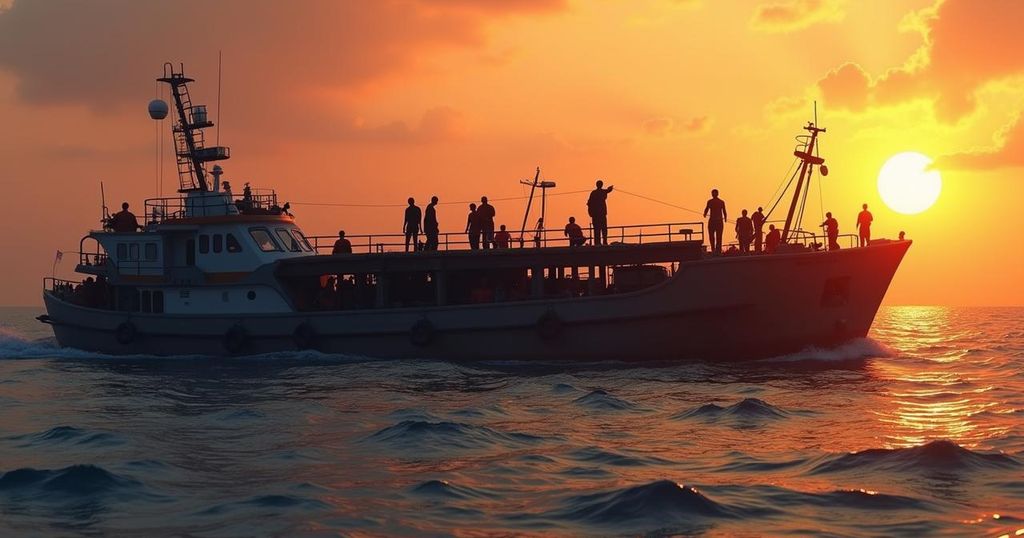In a devastating accident in Niger State, Nigeria, 14 bodies have been recovered and around 150 people are still missing after an overloaded boat capsized. The incident, attributed to government negligence and a lack of safety regulations, raises concerns about the ongoing dangers of water travel in Nigeria. Emergency services are continuing rescue efforts along the River Niger, stressing the need for stricter enforcement of safety measures.
In a tragic incident in central Niger State, Nigeria, a boat capsized late Tuesday, resulting in the recovery of 14 deceased individuals, while approximately 150 passengers remain unaccounted for. The Nigeria Emergency Management Agency attributed the tragedy to the boat being overloaded. Emergency personnel are actively engaged in search and rescue efforts along the River Niger, at the location of the incident. Reports indicate that the boat, which was transporting about 300 passengers who had attended a religious celebration in the nearby Gbajibo village, became unstable due to the excessive number of occupants. Although around 150 individuals were rescued, many others are still missing. Zainab Sulaiman, the emergency coordinator for Niger State, stated, “Right now, there are 14 corpses that have been recovered, and the local divers are still in the water right now. The boat was overloaded, which is what has been happening. They overload the boats, and, you know, most of these boats are old. So, with the weight of people, sometimes they even carry foodstuff in bags, you see that the boat capsizes or breaks into two.” Boat accidents are unfortunately common in Nigeria, where safety regulations regarding load limits and the use of life jackets are frequently overlooked and inadequately enforced. authorities also express concern about the locals who often disregard warnings against night-time water travel. The incident has sparked outrage over what appears to be government negligence. A local official noted, “As far as I’m concerned, there’s no one using life jackets in Niger State. You know, these are rural areas; they don’t even know what life jackets is all about. So, there’s nobody sensitizing them on the use of life jackets. The state government ought to have procured all these, but there’s none.” Sulaiman emphasized that stricter enforcement of safety regulations is imperative, asserting, “The regulatory authorities should start to enforce these laws. If they need to send officers there at the boarding point, it will go a long way.” Additionally, climate change factors, including increased water levels due to significant rainfall and flooding, exacerbate the situation. Last week, Nigeria’s hydrological agency issued warnings regarding rising rivers and potential flooding risks following the release of water from the Lagdo Dam in Cameroon. This recent disaster is reminiscent of a previous tragedy in which more than 60 farmers perished in northwest Zamfara State due to a similar boat capsizing incident.
The issue of boat capsizing and related accidents in Nigeria stems from a combination of factors, including overloading, poor enforcement of safety regulations, and lack of public awareness regarding safety practices. The Nigerian waterways experience frequent tragedies as numerous individuals travel for various reasons, including religious ceremonies, commercial activities, and day-to-day commuting. Unfortunately, safety measures such as the usage of life jackets are often neglected, especially in rural areas where communities may lack awareness or access to safety equipment. The Nigerian government has faced criticism for its inadequate response to these challenges, which are further complicated by climate changes such as rising water levels and increased flooding.
The unfortunate capsizing of a boat in Niger State highlights the persistent issues of safety regulation enforcement and public awareness concerning water travel in Nigeria. With 14 confirmed fatalities and around 150 people missing, this tragedy underscores the urgent need for governmental action to improve safety measures and ensure that individuals traveling on waterways are adequately protected. The call for stronger enforcement of existing laws, alongside community sensitization regarding safety practices, is essential in preventing future disasters of this nature. The added impact of climate change on water levels further complicates the situation, necessitating immediate attention from both local authorities and relevant agencies.
Original Source: www.voanews.com







